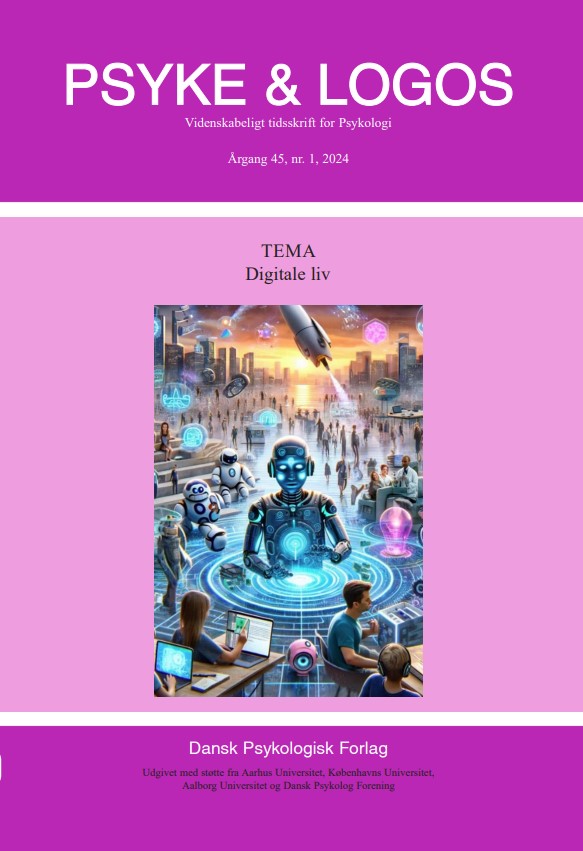"Fordi det er den nye virkelighed" - vildreden om ChatGPT læst teknologikritisk
DOI:
https://doi.org/10.7146/pl.v45i1.146545Nøgleord:
teknologikritik, chatbots, ChatGPT, AI i pædagogik og uddannelse, teknologioptimismeResumé
I artiklen undersøges den vildrede, der bredte sig blandt danske universiteter, da ChatGPT blev tilgængelig kort for vintereksamen 2022/23. Universiteterne så sig på meget kort tid nødsaget til at formulere nye retningslinjer for afholdelse af eksaminer – med vidt forskellige resultater. Her valgte en række institutioner at forbyde brug af chatbotten med det argument, at det producerede arbejde ikke kunne siges at være den studerendes eget. Der var dog andre tilfælde, hvor institutioner tillod Chat- GPT som lovligt hjælpemiddel. Ud fra to teoretiske perspektiver, der deler et fokus på relationen mellem mennesket og digitale teknologier, diskuteres universiteternes begrundelser ud fra en tese om, at teknologier som ChatGPT ikke udelukkende kan betragtes som skadelige eller gavnlige, men må anskues ud fra deres ambivalens inden for det pædagogisk-psykologiske felt.
Referencer
AAU (2023). Generativ AI på AAU. https://www.studerende.aau.dk/praktisk/it/generativai-pa-aau#hvad-skal-jeg-v%C3%A6re-opm%C3%A6rksom-p%C3%A5?%C2%A0-
Baltsen, L.B. (2023, 21. januar). Den overraskede verden med sin intelligens: Nu forbyder flere af landets universiteter chatrobot til eksaminer. Dr.Dk. https://www.dr.dk/nyheder/indland/den-overraskede-verden-med-sin-intelligens-nu-forbyder-flere-aflandets
Biesta, G. (2013). The beautiful risk of education. Paradigm Publishers.
Coeckelbergh, M. (2019). Skillful coping with and through technologies: Some challenges and avenues for a Dreyfus-inspired philosophy of technology. AI & SOCIETY, 34(2), 269-287. https://doi.org/10.1007/s00146-018-0810-3
Cook, J. (2023). Train ChatGPT To Write Like You In 5 Easy Steps. Forbes. https://www.forbes.com/sites/jodiecook/2023/06/15/train-chatgpt-to-write-like-you-in-5-easysteps/?sh=6b7ae4ab530f
Derrida, J. (1973). Speech and phenomena, and other essays on Husserl’s theory of signs. Northwestern University Press.
Derrida, J. (2004). „Plato’s Pharmacy“. I Dissemination. Continuum.
Dohn, N.B. (2006). Karaktergivning – intuitiv ekspertise eller ‘viden i praksis’? Dansk Universitetspædagogisk Tidsskrift, 1(1), 38-46. https://doi.org/10.7146/dut.v1i1.5673
Dohn, N.B. (2013). “Viden i praksis”—Implikationer for it-baseret læring. Res Cogitans, 9(1), 94-128.
Doroudi, S. (2022). The Intertwined Histories of Artificial Intelligence and Education. International Journal of Artificial Intelligence in Education. https://doi.org/10.1007/s40593-022-00313-2
Dreyfus, H.L. (1972). What computers can’t do: A critique of artificial reason (1. udgave). Harper & Row.
Dreyfus, H.L. (1992). What computers still can’t do: A critique of artificial reason (rev. udgave, [repr.]). MIT Press.
Dreyfus, H.L. (2001). On the internet. Routledge.
Dreyfus, H.L. (2007). Why Heideggerian AI failed and how fixing it would require making it more Heideggerian. Artificial Intelligence, 171(18), 1137-1160. https://doi.org/10.1016/j.artint.2007.10.012
Dreyfus, H.L. & Dreyfus, S.E. (1986). Mind over machine: The power of human intuition
and expertise in the era of the computer (Repr.). The Free Pr.
Dreyfus, H.L. & Kelly, S.D. (2011). All things shining: Reading the Western classics to find meaning in a secular age. Free Press.
Kemp, P. (1994). Det uerstattelige: En teknologi-etik (2. gennemsete udgave). Spektrum.
Kouppanou, A. (2015). Bernard Stiegler’s Philosophy of Technology: Invention, decision, and education in times of digitization. Educational Philosophy and Theory, 47(10), 1110-1123. https://doi.org/10.1080/00131857.2015.1045819
Lewin, D. (2016). The Pharmakon of Educational Technology: The Disruptive Power of Attention in Education. Studies in Philosophy and Education, 35(3), 251-265. https://doi.org/10.1007/s11217-016-9518-3
Lim, W.M., Gunasekara, A., Pallant, J.L., Pallant, J.I. & Pechenkina, E. (2023). Generative AI and the future of education: Ragnarök or reformation? A paradoxical perspective from management educators. The International Journal of Management Education, 21(2), 100790. https://doi.org/10.1016/j.ijme.2023.100790
Nissen, S.K. (2023, 9. februar). I fremtiden bliver en robot en del af din læsegruppe. Uniavisen. https://uniavisen.dk/i-fremtiden-bliver-en-robot-en-del-af-din-laesegruppe/
Rosa, H. (2016). Resonanz: Eine Soziologie der Weltbeziehung (1. udgave). Suhrkamp.
Rosa, H. & Endres, W. (2017). Resonanspædagogik: Når det knitrer i klasseværelset. Hans Reitzels Forlag.
Stiegler, B. (1998). Technics and time. Stanford University Press. https://doi.org/10.1515/9781503616738
Stiegler, B. (2010). Memory. I Critical terms for media studies (s. 64-87). The University of Chicago Press.
Stiegler, B. (2017). Philosophising by accident: Interviews with Élie During. Edinburgh University Press. https://doi.org/10.1515/9781474408240
Stiegler, B. (2020). Nanjing Lectures (2016-2019). Open Humanities Press.
Stiegler, B. (2020). Nanjing Lectures (2016-2019). Open Humanities Press.
Turing, A. M. (1950). I.—COMPUTING MACHINERY AND INTELLIGENCE. Mind, LIX (236), 433-460. https://doi.org/10.1093/mind/LIX.236.433
Vlieghe, J. (2013). Education in an Age of Digital Technologies: Flusser, Stiegler, and Agamben on the Idea of the Posthistorical. Philosophy & Technology, 27(4), 519-537. https://doi.org/10.1007/s13347-013-0131-x
Wenger, E. (1990). Toward a theory of cultural transparency: Elements of a social discourse of the visible and the invisible. Doctoral dissertation, University of California.
Žižek, S. (2023). Artificial Idiocy. https://www.project-syndicate.org/commentary/aichatbots-naive-idiots-no-sense-of-irony-by-slavoj-zizek-2023-03
Downloads
Publiceret
Citation/Eksport
Nummer
Sektion
Licens
Ophavsret er tidsskriftets og forfatternes. Det er gældende praksis, at artikler publiceret i Psyke & Logos, som efterfølgende oversættes til andet sprog, af forfatteren frit kan publiceres i internationale tidsskrifter, dog således at det ved reference fremgår, at den oversatte artikel har et forlæg i en dansksproget version i Psyke & Logos. Artikler kan frit deles og linkes til på forsknings- og undervisningsnetværk (så som Blackboard). Link foretrækkes, fordi det giver oplysning om brug af tidsskriftets artikler.




